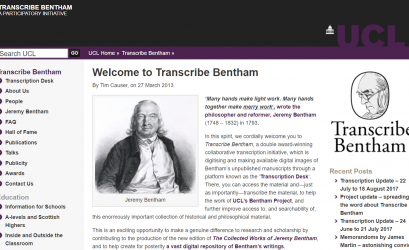Who?
The dissemination was initiated by the founder of the project Melissa Terras, University College London (UCL). With her blog announcement on February 8th, 2010 she informed the general public about the launching of the Bentham Papers Transcription Initiative and the secured funds. Work on the project started on March 1st, 2010 and the online tool - Transcription Desk is available for contribution since September 7th, 2010. The aim was to target the society as a whole, in particular individuals (altruists) interested in Bentham's life and thoughts, history and philosophy, crowdsourcing methodologies and the technology behind the project.
What & How?
Dissemination activities conducted within the project are numerous and vary from public information blogs, announcements and articles in the press, invited talks, journal articles to Twitter, Facebook posts, Wikipedia article and YouTube videos. One of the most important outputs of the project are the digitised/transcribed Bentham manuscripts that are made publicly available. Furthermore, the transcription tool, and the software behind it plays a special role in the digitisation process.
When?
The goal of the Transcribe Bentham project was to start with the dissemination in very early stages of the project, right after the first research lifecycle phase - Design, because the transcription through crowdsourcing was identified as very crucial for the success of the project.
With the adequate dissemination the founders of the project achieved to attract many volunteers to contribute by transcribing handwritten and unpublished work of Bentham.
Progress update is provided in a regular basis in the project homepage/blog informing the general public about the volunteer participation and percentage of the transcribed papers. This indicates that, even though most of the dissemination activities took place after the first phase, the dissemination is evident in each of the research life-cycle phases.
Relation to Open Science
Digitised Bentham's manuscripts are made publicly available through the UCL's digital library under a Creative Commons Attribution-NonCommercial-ShareAlike license (CC BY-NC-SA). This license is not compatible with the Open Definition due to the non-commercial clause. This clause restricts reuse; manuscripts can for example not be reused in Wikipedia due to this clause.
The code for Transcribe Bentham's MediaWiki-based transcription interface is available for reuse and customisation, on an open source basis (GNU General Public License) and can be extended by everyone.
Articles in the International Journal of Humanities and Arts Computing (IJHAC) are not available as open access, whereas some of the book chapters and articles of Melissa Terras are available for download in ResearchGate.
UCL performs surveys to get feedback from volunteers on the transcription tool in order to enhance its functionality and to increase the motivation of volunteers. Volunteers are fully credited in the volumes to which they contribute.
Effort
The disseminated materials such as blogs, videos, software and tutorials are of a high quality and very professional. Thus, dissemination costs are estimated as medium (< EUR 50,000).
Impact
The project is very well received from the general audience and achieves a high number of volunteers. The latest figures (March 2017) manifest this:
"17,842 manuscript pages have now been transcribed or partially-transcribed, which is an increase of 28 on last week’s total. Of these transcripts, 16,841 (94%) have been checked and approved by TB (Transcribe Bentham) staff."
The project has received several awards and prizes:
- 2010 Digital Equipment and Database Enhancement for Impact (DEDEFI) Award from the AHRC
- Award of Distinction in the Digital Communities category of the 2011 PrixArs Electronica
- 2012 Platforms for Networked Innovation competition, KNetworks Award
Gender
The founder of the project is a woman, Melissa Terras, who has a major role on the project. The dissemination started with her blog where she asked the general public to contribute in the digitalisation of Bentham's work. Her chapters, books and articles are peer-reviewed and some of them are published in ResearchGate.
Who are the volunteers? According to the volunteer statistics presented in Transcribe Bentham volunteers, two-third of the volunteers that took part in a survey were female. In general, in the dissemination materials and communication, there is no evidence of the gender sensitive language.
Highlight
|
||
|---|---|---|
|
"Many hands make light work. Many hands together make merry work" (Transcribe Bentham blog) - is one of the Bentham’s quotes that describes in the best way ever the success of the Transcribe Bentham project. With the contribution of many volunteers, it was possible to digitise very valuable handwritten yet unpublished work of Jeremy Bentham. As of March 2017, 17,842 manuscript pages have been transcribed or partially-transcribed. |
||
Link
For a more extensive analysis of the Transcribe Banthem case study, please follow the link: http://openup-h2020.eu/wp-content/uploads/2017/01/OpenUP_D4.1_Practices-evaluation-and-mapping.-Methods-tools-and-user-needs.pdf





